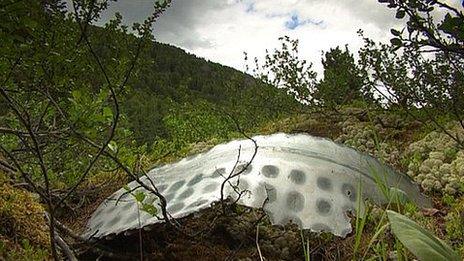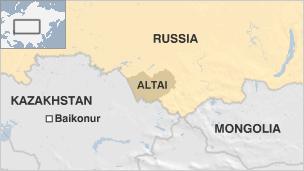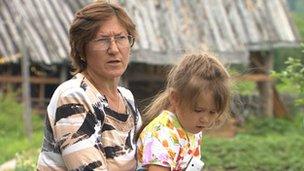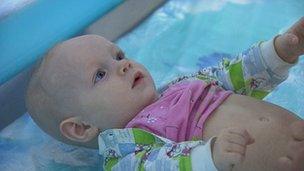Russians say space rocket debris is health hazard
- Published

Rocket debris can be found littering the forests of Russia's remote Altai region
It is very easy to find space junk in this part of the taiga - the forest where Russia meets Kazakhstan. Chunks of light-alloy metal gleam here and there in the grass and bushes.
Russia's Proton rockets have put many satellites into orbit, earning more than $6bn or £3.8bn for the country's space industry.
But every time a rocket is launched, the discarded booster stages fall in this area of eastern Siberia, hundreds of kilometres from the Baikonur cosmodrome.
Some of them are parts of the fuel tanks that contained toxic fuel.
And the people who live here are concerned about the possible health risks. Very little research has been carried out or published - but local people believe they are suffering.
"The rockets fall here, so this must be affecting people in some way," says Olga Tadykova, 46. She is the children's doctor in the village of Karakoksha, in Russia's Republic of Altai. The region lies directly below the flight path of the space rockets.
Ejected rocket stages fall quite close to the village which Olga shares with some 1,500 inhabitants. Environmentalists say the rocket debris contains highly toxic rocket fuel - unsymmetrical dimethylhydrazine (UDMH) - which spreads in the atmosphere and penetrates soil and water, harming plants and animals.

Health fears
Dr Tadykova has been treating local children for two decades, and over these years the symptoms have remained the same: anaemia, allergies, sore throat and skin diseases.
"It might be the environment," she says. She claims nobody has ever researched whether there is a link between space launches and the health of people in the area where the debris falls.
Most of the food local villagers have on their tables comes either from the taiga - virgin forest - or from their own vegetable gardens. There are few sources of income for local people - hunting and gathering pine nuts are the villagers' main occupations.
"The taiga is everything for us; we depend on it and we have no choice but to go there," says professional hunter Pyotr Avoshev. He hunts sable for their fur. And in recent years, he says, he has been catching more and more sick animals. Their pelts, with black spots and unusually short fur, are impossible to sell.
"It could be because of the rocket debris and the chemical pollution they bring," Mr Avoshev says. "I am not educated enough to say for sure. But I would still like to know. It may be dangerous even to go into the taiga."

Marina Lyamkina sees a link between the toxic fuel and a high local cancer rate
Cancer cases
"Our forests have become a space rubbish dump," says Marina Lyamkina, 47, Dr Tadykova's neighbour in Karakoksha.
Mrs Lyamkina says she cannot keep quiet when her motherland is being polluted.
"These toxins are accumulated in soil and water over decades. We consume poisoned food and water every day, and no one is here to tell us the truth."
Mrs Lyamkina believes that living in the area is dangerous. The villagers, she says, suffer high blood pressure and headaches. She also told me the rate of cancer among them was unusually high.
"I was scared when I counted the cases," she says. "There is someone with cancer in every house: either someone with a tumour, or who has had surgery, or already dead."
Another local resident, 76-year-old pensioner Fedosiya Gorbunova, says: "They hide the truth about the rocket fuel, they poison us and let us die here, and they don't care about us."
Ms Gorbunova had 11 siblings, of whom 10 died from cancer.
She said rocket launches were usually followed by rain that harmed plants in vegetable gardens and sometimes caused skin burns. She suspects it might be acid rain.
But these claims were contradicted by Anatoly Kuzin, deputy director of the Khrunichev State Research and Production Space Center.

Locals fear that toxic chemicals may be passed on to vulnerable infants
"We did special research into the issue. The level of acidity in the atmosphere is not affected by the rocket launches," he told the BBC.
Khrunichev is the birthplace of the Proton rocket, and according to Mr Kuzin, "there is no data to prove any link between the illnesses [in the population of Altai] and the influence of rocket fuel components or space activity of any kind".
Mr Kuzin also says Russia's space agency conducts thorough research constantly and no significant level of toxicity has ever been found in the Altai forests.
People who live near areas where rocket debris has fallen want the research made public. They also demand more medical check-ups for the population and free medicines for those who are already ill.
Yet so far they feel ignored, alleging that Russia puts commercial and strategic interests first.
- Published28 December 2011
- Published24 August 2011